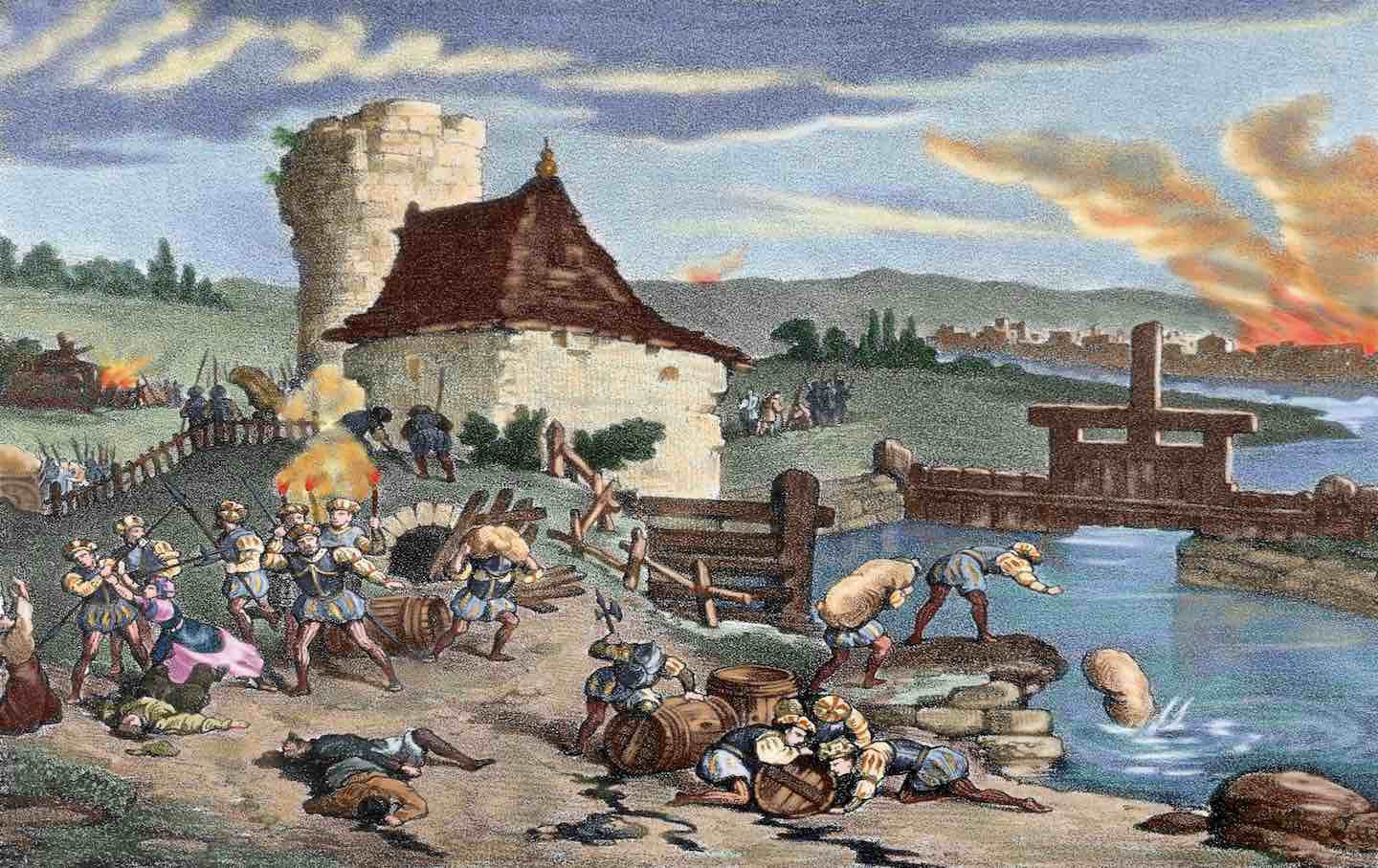Thomas Müntzer’s Misunderstood Revolution
A recent biography of the German preacher and leader of the Peasants’s War examines what remains radical about the short-lived rebellion he led.

The German reformer Thomas Muntzer (1491–1525) and his people during the German Peasants’ War (1524–25). Colored engraving. 19th century.
(Ipsumpix / Corbis via Getty Images)Whenever and wherever the world has been consumed in the flames of social crisis, prophets of apocalypse have emerged, organizing popular participation in and resistance to political transformations perceived as literally world-ending. Thomas Müntzer, a “radical anti-authoritarian” preacher who was briefly the scourge of 16th-century, Reformation-era Germany, was among the first and fiercest of these doomsaying prophets. Five hundred years have passed since Müntzer led a ragtag, landless army to its death against a reactionary coalition of German nobles, clerics, and landlords. The renegade priest’s legacy remains up for debate—he’s been valorized as a proto-Marxist hero, vilified in turn by anti-Marxist critics, and even dismissed through a comparison to ISIS.
Books in review
The Dreadful History and Judgement of God on Thomas Müntzer: The Life and Times of an Early German Revolutionary
Buy this bookHalf a millennium on, a recent biography by British historian Andrew Drummond, The Dreadful History and Judgement of God on Thomas Müntzer: The Life and Times of an Early German Revolutionary, seeks to rehabilitate Müntzer as a flawed but nonetheless inspirational link in a “global” history of anti-authoritarian uprisings. While Drummond carefully presents Müntzer as a man of his time, the Peasants’ War (1524–25) in which he played a leading role has its echoes in the French, American, Russian and anti-colonial revolutions of subsequent centuries—and perhaps even in our own era.
Müntzer was born in a revolutionary age. Drummond describes a 16th-century Germany in which the opening of trade routes brought about not only plagues, depopulation, and the opportunity for elites to “further enrich and empower themselves,” but also the corresponding cross-pollination of ideas and social upheaval necessary to catalyze resistance to seemingly timeless customs and patterns of exploitation. Whether deliberately or not, Drummond’s depiction of incipient urbanization and capitalism suggests intriguing parallels and analogies with our own time, worthy of further exploration.
The stage was therefore set for the Protestant Reformation, instigated by Martin Luther, to explode across Europe. At the time Luther launched his epochal critique of corrupt, institutional Catholicism, Müntzer was an angry, brilliant preacher in his late 20s. Luther demanded reform, but Müntzer and his associates went further, rapidly emerging as the Reformation’s radical wing.
In Luther’s nascent Protestant theology, canny secular rulers saw an opportunity to break Rome’s economic stranglehold on Northern Europe to suit their own pecuniary interests. But Müntzer took the natural next step, coming to believe that institutional authority, secular and church alike, was itself heretical, the provenance of the Devil, and needed to be overthrown in an imminent apocalyptic clash between God’s elect and a fallen world. This perhaps inevitable radicalization of Luther’s thought appealed to the immiserated peasantry, pitting them against a feudal gentry determined to cling to power—through either Catholic reaction or measured reform.
Drummond’s biography offers more exploration of this crucial historical and geopolitical juncture than any deep psychological excavation of the Reformation’s enfant terrible. Compared with his contemporary and rival, Luther, there is far less biographical material on Müntzer: Even his very birth year, Drummond laments, is unclear. The young priest comes and goes throughout the early 1520s, sporadically dropping out of the patchy written record in an era when the printing press was first beginning to disseminate incendiary theological ideas; engaging in potty-mouthed, fiercely erudite epistolary arguments and penning revolutionary manifestos; cropping up in Switzerland, Prague, and southwest Germany to foment dissent, incite religious riots, and clamber over town walls to escape arrest.
Luther himself ultimately took a reactionary position against the peasant uprisings that his own popularizing, democratizing religious reforms had helped to unleash. A reformist as well as a reformer, he condemned sporadic, localized violence against aristocratic landowners (or more often, the mere expropriation of their property) while happily justifying the exponentially worse slaughter of the peasants. His vituperative tract “Against the Murderous, Thieving Hordes of Peasants” is about as reasonable as it sounds, calling on the Protestant German aristocracy to “stab, smite, strangle” the rebellious poor. As Drummond shows, the aristocracy gladly obeyed, ultimately slaughtering up to 100,000 peasants who had been influenced by Müntzer and his fellow radicals.
Matters came to a head in 1525, as Müntzer led an explosive, doomed uprising against princely and priestly authority. The peasant movement, which is said to have believed that its leader could catch the enemy’s bullets in his sleeves, was rapidly suppressed, and Müntzer himself was captured by a collaborating alliance of Catholic and Lutheran forces, then tortured, forced to recant, and executed.
The drama of these final moments can obscure the more subtle anti-authoritarian implications of Müntzer’s theology. Drummond painstakingly draws out the historic significance of seemingly arcane theological debates over (for example) the “utraquist” dogma—that the congregation should be allowed to take both bread and wine at communion—demonstrating the shocking social ramifications of this frontal assault on the church’s ancient authority, which sought to assign to the people a sacramental privilege long reserved for the priests.
Likewise, Müntzer decided to abandon Latin, for centuries the language of obscurantist theological debate, for his native German, addressing himself directly to “you, the common people.” The results, in the published disputes with Luther that preoccupied him throughout the 1520s and reached an unprecedented and increasingly literate audience via the printing press, are deftly represented by Drummond as bold efforts to communicate with the masses via an innovative, “fecund” language of rhetoric, analogy, and insult in which clerics are “snakes” and the pope a “chamber pot.”
In opposition to the theology of Luther, Müntzer drew a sharp division between the elect and the godless, emphasizing the need for personal, subjective suffering as a precursor to God’s mercy, thereby encouraging peasants to think of themselves as divinely justified through the tangible fact of their suffering—and their exploiters as damned. By valorizing popular teaching and the divine origin of individual dreams, he further transferred agency away from priests and lords into the hands of ordinary people.
This dramatic shift culminated in a growing belief that God’s judgment on a godless world had to be at hand. Worsening personal and political repression only justified Müntzer’s sense of an approaching “swift and all-consuming apocalyptic revolution.” That loaded word, “apocalypse,” implies catastrophe—but also, etymologically, the revelation of divine and transformative mysteries. It was in this spirit that Müntzer heralded Christ’s imminent arrival on earth, to purge medieval Germany of bishops, lords, and exploiters. Little wonder that he’s been maligned by establishment opponents from Luther on as a “ravening wolf,” a “false prophet,” or quite simply as “Satan” himself.
While Müntzer’s own movement was too small, radical, and desperate to effectively challenge establishment Catholicism or reformist Lutheranism, his ideas endured, as Drummond shows, propelled across Europe by clandestine printing presses to animate subsequent centuries of dissenting religious thought, up to the English Civil War’s Levellers, Ranters, and Seekers.
Drummond cautiously draws the line here, establishing that while there’s a tentative religious succession at play, Müntzer was no secular “‘proto-Leninist.” Although his thought remained essentially religious, this millenarian sense of impending social transformation would nonetheless find new, secular expression in the French and American revolutions, the Marxist concept of history, and the turmoil of the revolutionary, socialist, anti-imperialist 20th century.
Popular
“swipe left below to view more authors”Swipe →At this point, two competing accounts of Müntzer’s heritage emerge. On the one hand, Engels and, later, the communist East German state claimed him as one of their own. On the other, anti-socialist historians have long sought to dismiss secular, Marxist concepts of social crisis and transformation through comparison to Müntzer, arguing that a millenarian sense of history leads ineluctably to political violence, totalitarianism, and catastrophe—often placing this argument beyond question through comparison to Nazi Germany’s own millenarian conception of an incipient new age.
It’s with this counterrevolutionary approach in mind that Drummond qualifies his arguments. We need not follow Engels in believing Müntzer was an “early proletarian revolutionary,” Drummond argues, in order to recognize the revolutionary significance of his wholesale assault on the 16th century’s “sacred domains of economic activity, property relations, and civil authority.” But in his well-meaning efforts to defend Müntzer from anti-communist attack, Drummond perhaps inadvertently downplays the continued relevance of the millenarian idea.
Certainly, there is no direct inheritance linking Müntzer to Lenin, or Hitler. But there are other forms of historical relationship, and the millenarian thought that proved powerful enough to radicalize a generation of indigent peasants still drives resistance, unrest, and bloodshed today. The millenarian sense of earthly turmoil as a sign that total social upheaval is at hand was put to revolutionary use before, during, and after Müntzer’s time, as people rally around prophets, leaders, and movements making the powerful argument that their present suffering will be justified by a better life soon to be realized here on Earth.
We need not shrink from these comparisons. As Drummond notes, scholars of political violence and representatives of the contemporary German Evangelical Church have lazily compared ISIS to Müntzer, attempting to dismiss any and all millenarian politics as equally deluded. Yet these caveats notwithstanding, ISIS cannot be understood without reference to a distinct Islamic tradition of millenarianism, as the group fought to actively bring about the end times by fulfilling eschatological prophetic precepts and thus instigating a new era of misogynistic theocracy.
Careful study of millennia-old theology certainly illuminates the profound dangers inherent in millenarian thought, which can variously result in the dangerous promotion of political quietism in the sure belief that a better world is at hand; racist, ethnocentric retreat, as in the United States’ widespread contemporary Christian millenarian movement; or ISIS-style retributive ethnic violence. The sense that a given people, state, or group stands on the cusp of historic transformation can engender movements devoted to a deluded, reactionary ideal.
But this is why it’s vital to follow Drummond in tracing a competing, transformative, revolutionary history of millenarianism, and to assess the social ramifications of what we could term the millenarian idea’s transmission through radical history. Notably, anti-colonial struggles have almost inevitably taken on millenarian form, often mystically appropriating the religion of the colonizers to organize armed resistance and social reform. From epochal, nation-making uprisings in China, the Philippines, and Indonesia; through centuries of resistance across Latin America; to the Native American Ghost Dance movement, Rastafarianism, and even cargo cults, there are literally hundreds of diverse examples.
Even if we accept that Müntzer’s uprising was a doomed, madcap venture, we can still learn from its example. Müntzer is famed for his revolutionary slogan Omnia sunt communia—“All things in common”—but it’s likely that he only ever uttered this concrete commitment under torture, in a confession extracted following his failed rebellion and intended to prove that the theologian was an unacceptable danger to the social order. This doesn’t discredit the idea; rather, as Müntzer’s “dreadful history” shows, ideas born of hardship, suffering, and defeat can nonetheless travel through the centuries to remake the world.
More from The Nation

The Harrowing Ardor of Heather Lewis The Harrowing Ardor of Heather Lewis
Her fiction was miscast as merely transgressive. Rather, her novels were interested in understanding life in its most unvarnished and unmediated.

What the Paiva Family Means to Brazil What the Paiva Family Means to Brazil
In I’m Still Here, one Brazilian clan’s confrontation with the military dictatorship dramatizes the last half-century of Brazil’s democratic travails.

Beatriz Nascimento’s Histories of Afro-Brazilian Rebellion Beatriz Nascimento’s Histories of Afro-Brazilian Rebellion
The scholar, poet, and filmmaker devoted her life to sketching out a revisionist historiography of resistance in Latin America but also the world.

“The Pitt” and the Gritty Return of the Hospital Drama “The Pitt” and the Gritty Return of the Hospital Drama
In the frenzied medical drama, the limits and problems of the healthcare system serve as the basis for the show’s plot.

The Uncomfortable Genius of Mike Leigh The Uncomfortable Genius of Mike Leigh
In “Hard Truths,” Leigh reminds us that a family dinner can tell the story of a whole society.

The Real Problem With Trump’s Cheesy Neoclassical Building Fetish The Real Problem With Trump’s Cheesy Neoclassical Building Fetish
Sure, it’s a dog whistle for “retvrn” types and the results are tacky—but that’s not the worst part.


